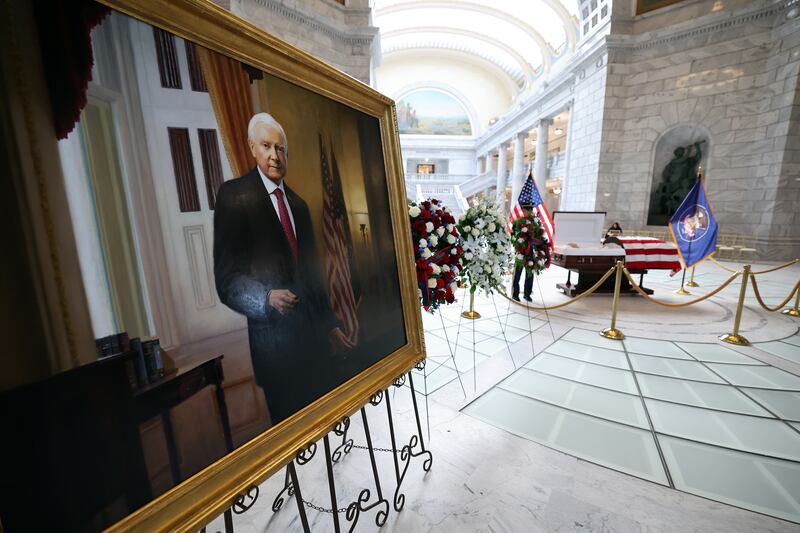During former Sen. Orrin Hatch’s extraordinary funeral last week, personal memories were ignited in my head, and at least some of them merit sharing.
Much has been said about the public record and achievements of this seven-term giant of the Senate, but has enough been said about the private man?
My friendship with Orrin lasted 47 years, and it didn’t begin well. It was 1975, and I was sitting in my office at the OC Tanner company where I was planning and managing the bond election campaign to build Symphony Hall. It was the end of a long day and I almost didn’t take the call from someone I’d never heard of — but when I picked up the phone, Orrin got right to the point. As near as I can recall, it went something like this “Look, I’m an attorney from Pittsburgh, but I’ve moved to Utah and I’m going to run as a Republican for the U.S. Senate next year. I watched how you managed Jake Garn’s Senate campaign last year and it was brilliant. I want to talk to you about planning my campaign.”
I was tired, so I got right to the point too. “Well, Mr. Hatch, I don’t know you, but my first instinct is to strongly discourage you. First, you’ll be viewed as a carpetbagger; second, you won’t get the nomination because there are already three really strong Republican candidates, including congressman Sherm Lloyd; and third, even if you could get nominated, Frank Moss, as a three-term incumbent would be almost impossible to beat.”
What I remember is how calmly and pleasantly Orrin responded. He said he understood all that, but he had a strong spiritual feeling that he should run and believed that, despite the odds, he could win.
We stayed in touch, but I was called later that year to be a mission president for The Church of Jesus Christ of Latter-day Saints in London and watched from a distance as Orrin won the convention, won the nomination and won the election. He had an abiding sense of foreordination to public service and he followed, doggedly, the promptings he felt.
Despite that inauspicious beginning, we grew closer over the years. All nine of our children served as summer interns in the senator’s Washington office, and whenever we visited in person on or the phone, we talked about our wives and families first, and politics second.
I remember one particular day, in his Salt Lake office, when he was worried about something and asked me to give him a priesthood blessing. I felt his spirit that day and his simple desire to just do the right thing. Over the years we had talked about how great it would be if there were a cabinet level department of family, or of children and parents, officially recognizing the family as the basic unit of society, overseeing family impact statements on legislation and judicial rulings, and seeking ways to make federal policy and taxes work for rather than against married partners, parents and children.
I watched Orrin evolve from a conservative ideologue in his first term to someone who could work across the aisle, who could listen, and who could appreciate positions different than his own. And he was never too busy to help on personal matters.
When we were trying to get visas for a Bulgarian girl and a Ukrainian boy who wanted to come live with us and go to college, Orrin made it happen. During each of the times when we lived in our McLean, Virginia, home, Orrin and his wife, Elaine, were in their long-term home in neighboring Vienna; our wards met in the same building, and I always admired their humble, just-part-of-the-congregation demeanor.
Our daughter, Shawni, when she lived in our house with her young family, worked in the Relief Society with Elaine and has never forgotten her faithful dedication and common touch.
But my final memory during the funeral last week was much more recent and exemplifies the two things I admired most about Orrin Hatch — the fact that he had so little bad to say about anyone and so much good, and that he knew how to use the self-interest of others to further a cause of his own.
We were having an extended phone conversation as I was driving to St. George and he was at home in Vienna, and I made a disparaging comment or two about President Donald Trump. His response was that I shouldn’t judge so harshly, and that one thing he admired was the strong family orientation of Trump, his relationship with his children and their loyalty to him and to the family. In fact, he said, this president might be the one to consider the cabinet-level office on children and parents that we had long discussed.
He asked me to write up a concept paper on the idea which he would personally deliver to Trump. His last comment on the phone that day illustrated this rare combined skill of commitment to causes mixed with the practical-political vision of how things might get done. “Be sure you emphasize the political benefits to Trump — how well this family department idea would fly with his conservative base.”
If I had only four words to eulogize Orrin Hatch, I would say “Spiritually centered, politically skilled.” And we, in Utah, were the beneficiaries of these gifts for 42 years.
Richard Eyre is a New York Times bestselling author.

